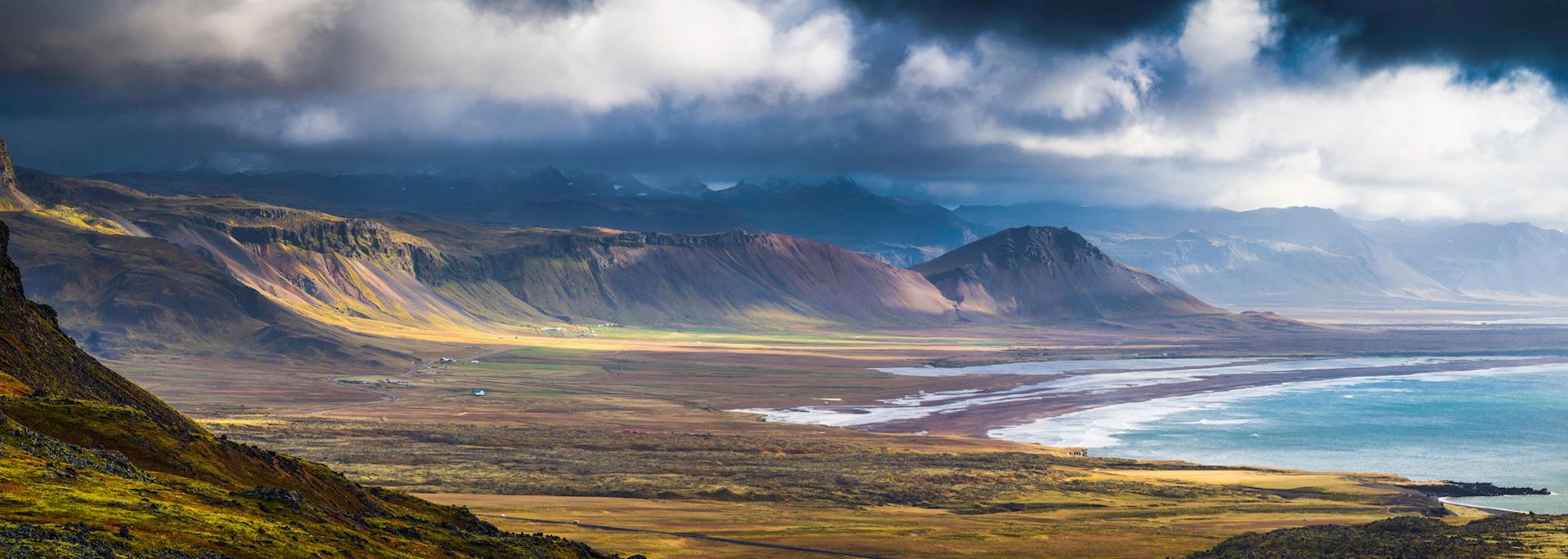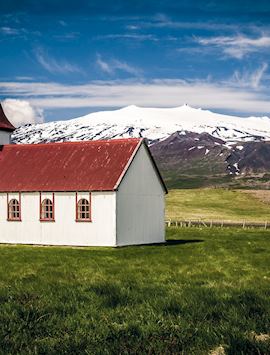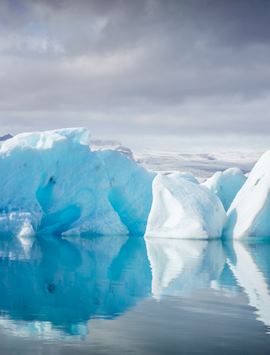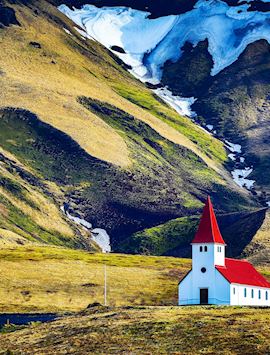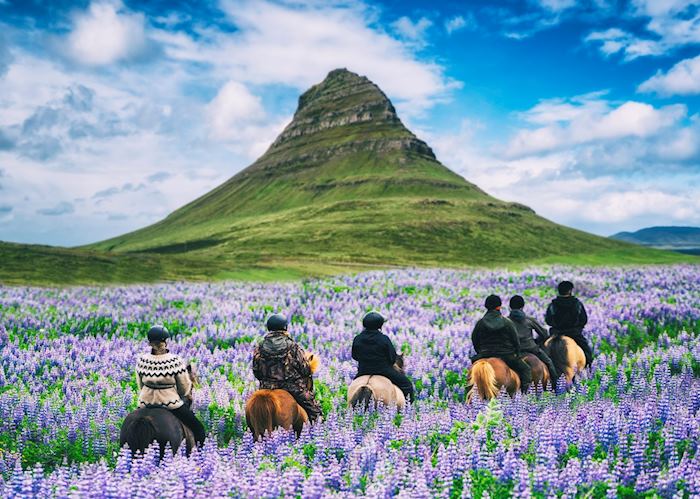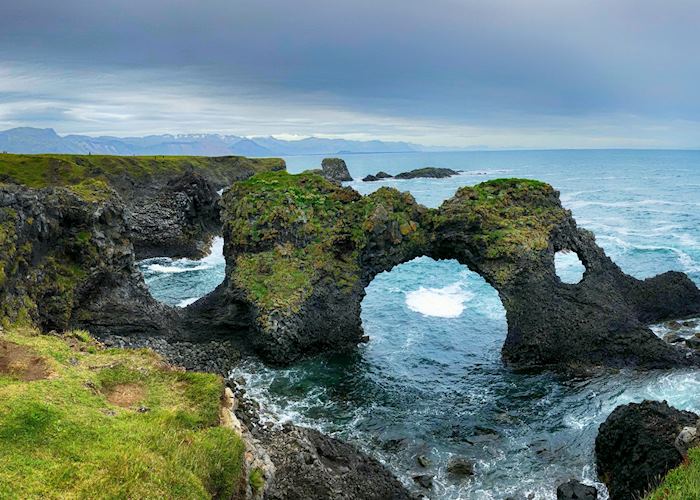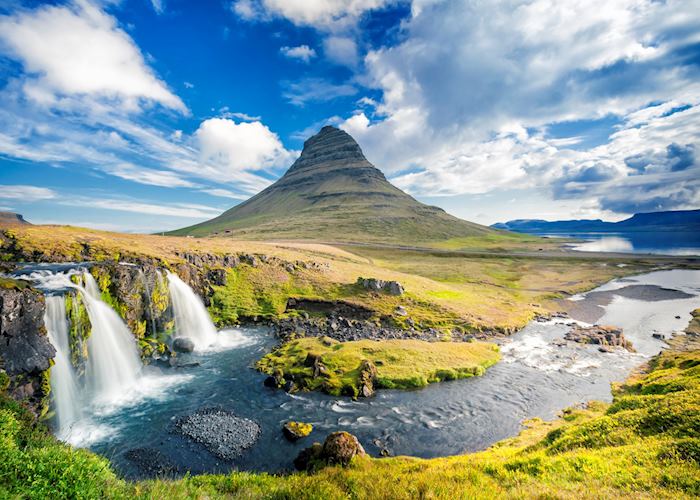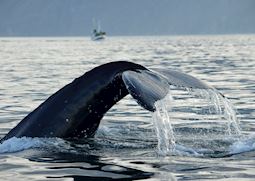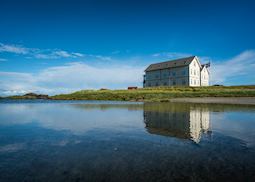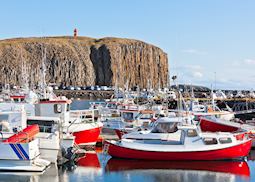Jump to:
On a clear day, you can see the icy peak of Snæfellsjökull from central Reykjavík. A glistening glacier caps this stratovolcano on the easily accessible Snæfellsnes Peninsula, a region of deep fjords, bleak lava fields and sandy beaches about a two-hour drive from the capital. Jules Verne was so smitten by the primal landscape he set his science-fiction novel Journey to the Centre of the Earth here. Today, its proximity to Reykjavík, diverse scenery, impressive hiking, glacier tours and whale watching make it a place to experience many of Iceland’s most renowned attractions.
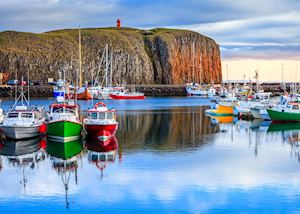 Stykkishólmur is the largest town on the peninsula, which stretches out for 100 km (60 miles). A fishing village set around a natural port, its brightly painted, 19th-century buildings give a traditional backdrop to its futuristic church. Known as Stykkishólmskirkja, the church’s bell tower is designed to look like a giant whale vertebra.
Stykkishólmur is the largest town on the peninsula, which stretches out for 100 km (60 miles). A fishing village set around a natural port, its brightly painted, 19th-century buildings give a traditional backdrop to its futuristic church. Known as Stykkishólmskirkja, the church’s bell tower is designed to look like a giant whale vertebra.
The town’s small museum, Norska Húsið, chronicles local life over the centuries. The upper floor of the building is laid out as a private residence would have been in the 19th century.
Nearby, the Bjarnarhöfn Shark Museum is also a worthy stop. Watch a short video to learn how to make the local delicacy known as hákarl — a dish made from shark meat that’s been fermented and then hung to dry. You can also visit the drying house where shark is cured, and if you’re interested, try a few bites along with a serving of rye bread.
The town acts as the commercial and transport hub for the region, but the area’s biggest landmark is the Snæfellsjökull volcano and its ice cap. It is here that Jules Verne’s protagonists venture into the heart of the crater guided by a 16th-century Icelandic text. The mountain is just as impressive in real life — the volcano’s enormous throat is filled with ice that extends well beyond the peak, like a generous dollop of icing. Conditions can be hazardous, so the only way to go up onto the glacier is on a guided tour.
The glacier and surrounding lava fields sit at the western tip of Snæfellsnes Peninsula and are part of the Snæfellsjökull National Park. In addition to taking tours of the glacier, you can hike the lower regions of the park independently and visit the lava fields and lava tubes.
Formed 8,000 years ago, the Vatnshellir lava cave descends deep into the rock. To explore, you follow a guide down into the eerie subterranean world on a spiral staircase, hearing about the science behind the formation of the cave as well as the folklore attached to it. You’ll also get to see the cave in complete darkness when everyone turns off their flashlights.
The park is criss-crossed by paths — those along the coast offer good birdwatching opportunities and you’re likely to see playful puffins on the sea cliffs.
Boat trips from Stykkishólmur (located an hour east of the park) head for the islands of Þórishólmur and Steinaklettar, which also host large numbers of puffins between May and August.
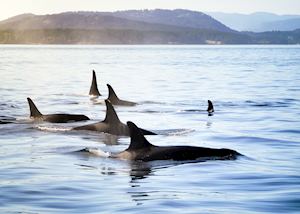 This coastal region is also a prime spot for whale watching. Herring use local fjords as their winter feeding grounds and orcas follow in large numbers. A boat trip between late winter and early summer offers the best chance of seeing these apex predators, although white-beaked dolphins, minke whales and humpbacks can be seen year-round. You’re most likely to see sperm whales in May and June.
This coastal region is also a prime spot for whale watching. Herring use local fjords as their winter feeding grounds and orcas follow in large numbers. A boat trip between late winter and early summer offers the best chance of seeing these apex predators, although white-beaked dolphins, minke whales and humpbacks can be seen year-round. You’re most likely to see sperm whales in May and June.
One of the most photographed sights in the region, and in Iceland, however, is the distinctive conical peak of Kirkjufell (Church Mountain) on the north coast of the peninsula. Its symmetrical cone is fronted by Kirkjufellsfoss, a nearby waterfall, making an arresting tableau that’s appeared in Game of Thrones and countless social media posts.
On the south coast, you’ll find unusual rock formations and black lava pebbles on Djúpalón Beach. You might also test your mettle (carefully) by trying to pick up the beach’s four well-known steintökin — natural ‘lifting stones’ of different weights that were traditionally used to gauge the strength of aspiring fishermen. The smallest is Amloði (Bungler), which weighs in at 23 kg (50 lbs) and the largest is Fullsterkur (Fully Strong), which is a whopping 154 kg (340 lbs).
Also worth visiting is Rauðfeldsgjá canyon, a cleft in a large stone that’s located just a short, uphill hike from the road. As you get closer, you’ll be able to make out the small shallow stream that burbles out of a fissure in the dark rock face. Walking on stones and splashing through the water, you can follow the stream deep into the heart of the rock, where you’ll discover a hidden mossy grotto.
The peninsula is also home to Ytri Tunga, Iceland’s only yellow-sand beach. During the summer months, you might get to see a colony of seals basking on the beach’s seaweed-covered rocks.
Best time to visit Snæfellsnes Peninsula
The Snæfellsnes Peninsula makes a good destination year-round. Visit between May and August to see puffins, between July and September to go hiking on the Snæfellsjökull glacier, or between December and April for the best chance of seeing orcas in the surrounding waters.
who's been there

Start planning your tailor-made trip to Snæfellsnes Peninsula by contacting one of our Iceland specialists
-
01993 838 92501993 838 431
- Make an enquiry
Suggested itineraries featuring Snæfellsnes Peninsula
Our itineraries will give you suggestions for what is possible when you travel in Snæfellsnes Peninsula, and they showcase routes we know work particularly well. Treat them as inspiration, because your trip will be created uniquely by one of our specialists.
Places near Snæfellsnes Peninsula
- Flatey 33 miles away
- West Iceland 44 miles away
- Reykjavík 64 miles away
- Blue Lagoon 75 miles away
- Southwest Iceland 77 miles away
- Langjökull 87 miles away
- Golden Circle 97 miles away
- South Iceland 130 miles away
- Westman Islands 134 miles away
- South Coast 145 miles away
- Troll Peninsula 148 miles away
- North Iceland 153 miles away
- Akureyri 155 miles away
- Vatnajökull National Park 183 miles away
- Lake Mývatn 183 miles away
- Dettifoss 204 miles away
- Jökulsárlón 215 miles away
- Eastfjords 255 miles away
Photos of Snæfellsnes Peninsula
Our expert guides to exploring Snæfellsnes Peninsula
Written by our specialists from their own experiences of visiting Snæfellsnes Peninsula, these guides will help you make the most of your time there. We share both our practical recommendations and the best ways to appreciate Snæfellsnes Peninsula at its best.
-
Highlights of Iceland: volcanoes, glaciers, whales and waterfalls ![Humpback whale]()
Highlights of Iceland: volcanoes, glaciers, whales and waterfalls
Highlights of Iceland: volcanoes, glaciers, whales and waterfalls
Iceland is shaped by fire, ice and folklore. Whether you’re a summer or winter visitor, you’ll find lots to experience here, from whale watching to hiking through ice caves and even bathing in beer. Iceland specialist Katy shares her highlights.
Read this guide
Accommodation choices for Snæfellsnes Peninsula
We've selected a range of accommodation options for when you visit Snæfellsnes Peninsula. Our choices usually come recommended for their character, facilities and service or location. Our specialists always aim to suggest properties that match your preferences.
-
![Hotel Egilsen, Stykkishólmur]()
Hótel Egilsen
Snæfellsnes Peninsula -
![Hotel Búðir, Búðir]()
Hótel Búðir
Snæfellsnes Peninsula
Ideas for experiencing Snæfellsnes Peninsula
Our specialists seek out authentic ways to get to know the places that could feature in your trip. These activities reflect some of the experiences they've most enjoyed while visiting Snæfellsnes Peninsula, and which use the best local guides.
-
Viking sushi boat trip ![Stykkishólmur]()
Viking sushi boat trip
Viking sushi boat trip
Explore the minor fjords, sea cliffs, nesting sites and islands of Breiðafjörður, one of Iceland’s most scenic fjords, to see myriad birdlife, take in the impressive views and sample seafood freshly caught and prepared as Viking sushi.
View details

